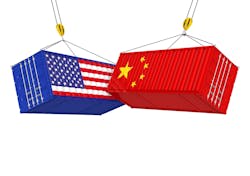My column last week—The Real Cost of Tariffs— questioned whether a strictly positional negotiating stance on tariffs would deliver what the U.S. is interested in. It generated a lot of strong negative feedback:
Oz wrote:
This article makes zero sense. The tariffs were never about one company or their short-term profits; it was about finally leveling the international playing field. It wasn't just China that the tariffs were directed at but China is the one that resisted the most. As Trump famously said when tariffs were first implemented, "You don't like tariffs? Great, I'll accept zero tariffs by both parties and the USA will still be the winner.” He just wants U.S. businesses to have a fair chance at both foreign and domestic markets.
Read previous Supply Chain Initiative columns by Paul Ericksen
And Toppers had this to say:
How many other industries and jobs have we given away by turning our heads and neglecting unbalanced tariffs, currency manipulation, IP theft, environmental and employment abuses, just so Boeing can sell into China? It is time our government quit shilling for the Boeings of the world unless those efforts coincide with policies that also advance overall trade fairness for all US industries. The real cost of not having tariffs has in this way been borne by my industrial plumbing customer, and power distribution customer, and lawn and garden customer, and computer hardware customer, and HVAC equip customer, and steel mill roller customer, and numerous other industries thrown under the bus by current trade practice as an acceptable sacrifice in order to achieve access into Chinese markets for companies like Boeing.
In my career in supply chain leadership, I’ve observed that negotiating strategies based on a single tactic more often than not do not deliver the optimal result.
Another way of putting this is that “To people that only know how to use a hammer, everything looks like a nail.”
Readers called me out for ignoring the negative impact a lack of tariffs has had on smaller firms and suppliers. But Boeing’s loss of a $35 billion China airplane order is not just a setback for Boeing—it affects the entire supply chain, and some of those manufacturers are small operations. See: Boeing’s 737 Product Cut Echoes Throughout Aerospace Industry.
RichardNotFamous said that China is not the culprit I make them out to be, that U.S. regulators and large U.S. manufacturers are to blame for the trade imbalance:
US regulators have spent 30 years caving to lobbyists on behalf of the largest US companies who wanted to crush smaller manufacturers. Now that they’ve milked the current arrangement for most of its value they want to come back and fill the spaces they created. DOJ would be all over those companies if they tried to use scale and loss leading tactics to dominate markets if the production cycle was US based. But they got around antitrust regulations with legislation that permitted technology transfer and preferential duties.
The bad guys here are U.S. manufacturers who dumped their employees and sent operations overseas. Worse, they were rewarded for it by U.S. legislators
Perhaps so, but China certainly took advantage of the situation.
Keep the feedback coming!
Paul Ericksen is IndustryWeek’s supply chain advisor. He has 38 years of experience in industry, primarily in supply management at two large original equipment manufacturers.
About the Author

Paul Ericksen
Executive Level Consultant; IndustryWeek Supply Chain Advisor
Paul D. Ericksen has 40 years of experience in industry, primarily in supply management at two large original equipment manufacturers. At the second he was chief procurement officer. He then went on to head up a large multi-year supply chain flexibility initiative funded by the U.S. Department of Defense. He presently is an executive level consultant in both manufacturing and supply chain, counting Fortune 100 companies among his clientele. His articles on supply management issues have been published in Industrial Engineering, APICS, Purchasing Today, Target and other periodicals.
